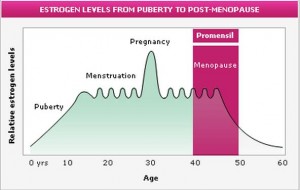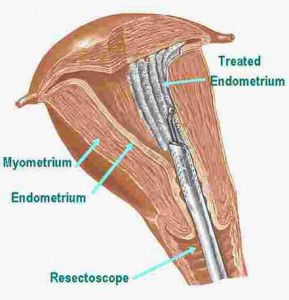Pre Menopause – Symptoms, Signs, Diet, Treatment
Pre menopause is the time or stage in life prior to menopause. It is known as perimenopause, or the phase when women experience changes in the reproductive functioning before a complete cessation of menses. There is also cessation of egg production by the ovaries during menopause. Because of this, a woman may no longer menstruate. The term ‘pre menopause’ may cause misconceptions as pertaining to children or adolescence and the period before menopause. Because of this, gynecologists and most physicians accept the term perimenopause.
Pre menopause Age
The average age for pre menopause starts beteen 35 to 40 years of age. During these times, women experience signs of changing hormone levels. However, there is no specific time when pre-menopause may occur because each woman has unique characteristics and may experience symptoms differently.

The Estrogen Levels throughout Womanhood with the levels decreasing during Menopause
Symptoms and signs of Pre Menopause
There are a lot of symptoms that may be experienced during the pre menopause stage. All of these are associated with the reduction of hormone levels in women. Symptoms and signs include:
- Irregular periods
When the hormones are already reduced because of pre menopause, there will be irregularities in menstruation due to the absence of adequate hormones to regulate the menstrual cycle. Irregular periods may occur from four to ten years prior to complete cessation of menses. Irregular menses may mean shorter or longer periods than before as well as lighter or heavier menses than normal. The perimenopause stage is considered over when the woman experiences menopause by not having menses for one year or more.
- Irritability and Mood Swings
Estrogen and progesterone also regulate the mood of a person. The scenario is similar to the premenstrual syndrome women experience. Prior to menstruation, the level of the hormones decrease which leads to mood swings. Women may need emotional and psychological support during this stage in order for them to cope with the changes in their bodies. Lack of support may lead to depression
- Decrease in Bone Density
Estrogen hormones reduces bone resorption or the escape of calcium in the bones. When estrogen levels decrease, regulation is limited, thereby allowing the reduction of calcium in bones and in blood, leading to a reduction in the bone density. This explains why older women are more prone to osteoporosis.
- Hot Flashes
Hot flashes are also a common symptom. The condition appears as a sudden increase in body temperature. Hot flashes can cause discomfort, especially when there is a sudden increase in body temperature of more than two degrees. Hot flashes are the inability of the body to regulate temperature efficiently. During hot flashes, women may experience intense sweating and feelings of weakness or fatigue similar to fever. However, hot flashes are not considered harmful and may resolve in a few minutes or hours.
- Weight Gain
Women may also experience weight gain because of water retention. This happens due to the inability of the body to regulate water.
- Breast Tenderness
Breast tenderness is also experienced similar to the premenstrual syndrome as a result of the reduction in estrogen levels.
- Thinning of Hair and Drying of Skin
Women may also experience changes in the integumentary system because of erratic changes in hormone levels.
- Migraine Headaches
Headaches are a common symptom of the reduction in hormone levels.
- Decreased Libido
Sex hormones are also responsible for the sexual functioning of women. Changes lead to decreased libido and sexual desires.
- Insomnia
Insomnia may also be experienced as a result of psychological disturbances and hot flashes at night.
- Loss of Vaginal and Urinary Tone
A decrease in estrogen leads to loss of elasticity and lubrication of the vagina. This may cause increased susceptibility to infections and painful sexual intercourse. This also leads to loss of tone of the urethral meatus and urinary incontinence.
- Increase in Cholesterol Levels
Once estrogen has decreased, there will be an increase in the bad cholesterol and a reduction in good cholesterol that may predispose women to certain heart diseases.
Treatment Regimen for Pre-menopause
Prior to the onset of menopause, women should consult a gynecologist in order to adapt to menopause easily. Certain therapies are employed to help the woman undergo the transition in her life without severe discomforts. Therapies include:
Hormone replacement Therapy
The basic treatment is to replace the hormones in the body which have decreased a result of pre menopause. Hormone replacement therapy may include oral contraceptives which have estrogen content or a woman may choose progestin therapy. When hormones are established, they help women return to their normal body function and reduce most symptoms.
Endometrial ablation
Endometrial ablation may be used for women suffering from heavy menstrual flow. This procedure involves the destruction of the thick endometrial lining with the use of heat, electrical energy or laser.

Endometrial Ablation Procedure Involving Scraping the Thick Endometrail Lining
Proper nutrition
Calcium is very essential for pre-menopausal women to reduce the risk for osteoporosis. A low-fat diet may also be practiced to prevent high cholesterol levels and to prevent heart diseases.
Stress Reduction activities
Pre menopausal women may experience stress as a result of discomfort associated with the transition. Women should engage in activities like yoga, meditation, massage therapy or other stress-relieving therapies to help them cope.
Exercise
Exercise is also essential to maintain healthy bones and overall health. Adequate exercise also prevents weight gain and improves the sleep pattern of pre menopausal women.
Alternative medicine
Women may also consider alternative medicines such as the use of a back cohosh, phytoestrogens and DHEA. Black cohosh is an herb extract that is beneficial for the management of hot flashes and other symptoms. Phytoestrogens are compounds found in plants such as flax seeds that are similar to natural estrogen in the body. Finally, dehydroepiandrosterone (or DHEA) is a steroid produced by the adrenal gland to reduce symptoms of pre menopause. DHEA can be taken in the form of supplements.